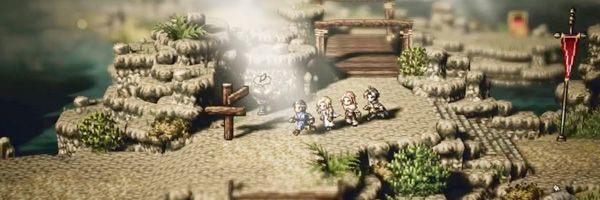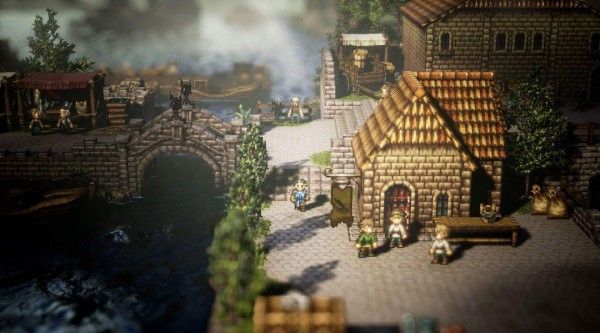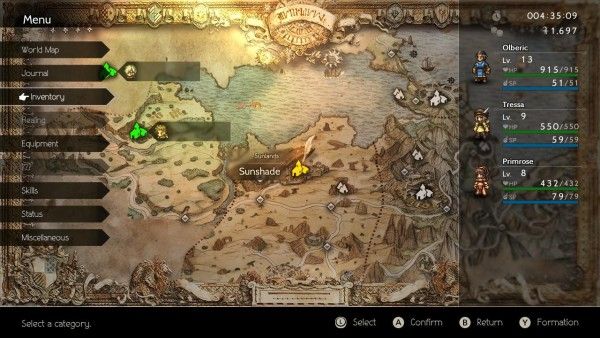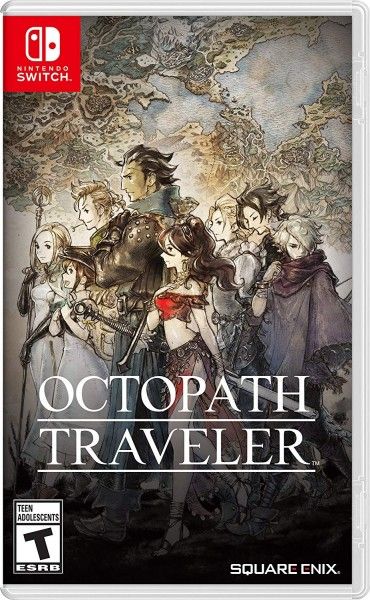Octopath Traveler was one of my most-anticipated games of the year. I’ll always have a soft spot for JRPGs no matter how ridiculous or homogeneous they get because I became very attached to Final Fantasy VII and Chrono Trigger in my youth. I’m always on the lookout for another JRPG to devour most of my time, and I’ve been lucky enough to find a few here and there with games like Fire Emblem: Awakening, Jeanne d’Arc, and Rogue Galaxy. That also means I’ve come across some misfires like Fire Emblem: Birthright and Ni No Kuni. Sadly, Octopath Traveler falls into the latter category for a clear and shockingly obvious reason.
For those who are unfamiliar with the game, the name “Octopath” derives from the eight characters who each have their own story. None of the stories are particularly imaginative, but they’re good enough for a starting point. One character wants revenge against the soldier who brought down his old kingdom, another wants to find her missing mentor, another wants to be the best merchant in the world, another wants to be the best apothecary in the world, and so forth. The writing is cheesy at best and inscrutable at worst (the writing on H'aanit to make her sound like she’s talking in old English is borderline unreadable). And yet, this is not the fatal flaw of Octopath Traveler.
The fatal flaw is the omission of something that should be obvious to anyone who has ever played any RPG. You have a party of characters. They have different personalities. Typically, you put these different personalities together and you get fun interactions. There’s camaraderie and conflict among your leads, and it’s neat to see how they bounce off each other. Eventually, you may settle into a party you like the best where you like each of the characters as individuals and as a group.
Octopath Traveler never has your eight characters interacting with each other.
It’s kind of mind-boggling oversight. Here you have eight characters, each with their own stories, and at no point do they ever converse or take stock of each other. They’re separate people who are together not because of a shared mission or mutual interest, but because it’s a video game and you need to have four members in your party and four waiting for you at the local tavern in case you need to swap somebody out. It’s insane! Imagine a game like Final Fantasy VI with its huge cast of diverse characters and no one ever interacts with each other. That’s Octopath Traveler.
That kind of bad writing makes the energy drop out of all eight stories. Even if you’re on a particular character’s chapter, it feels hollow, like they have the spotlight all to themselves, but in a way that never comes alive. I don’t know how Olberic feels about Tressa’s quest to become a great merchant or what Cyrus thinks about Therion’s thieving. In good stories, characters are defined not only by their own actions, but how they’re perceived by other characters, but Octopath Traveler leaves out that entire part of the narrative. Sure, you’re fighting beside members of your party and traveling around on a mission, but you never forget how empty all of it feels.
For example, in Therion’s first chapter, he has to rob a manor. A heist should make for great interplay between the characters. How does someone honorable like Olberic feel about it? Does a merchant like Tressa admire the stealing of goods or does she look down on theft? How does an intellectual like Cyrus perceive this event? You never know because the characters don’t matter unless you’re on their particular chapter.
What’s even more frustrating is that there’s a solid game built around this failed narrative. The graphics are astounding, and if Square Enix said they were remaking their 16-bit games in the 2.5D HD style of Octopath Traveler, I wouldn’t be able to give them my money fast enough. The combat is fast and thoughtful, and the game plays by solid JRPG rules of chests, skills, and leveling up for new abilities. It doesn’t have a lot of curveballs, but on the surface, it’s a solid JRPG that makes you want to explore.
Except that exploration feels like a dead end. Octopath Traveler is a game that will force you to grind a lot because characters don’t level up unless they’re in your party, and having characters in your party solely so they can gain levels makes you feel like you’re doing work rather than engaging in a story. If I add Primrose to my party, I’m not going to learn anything about her or what she thinks of the other party members. She’s just going to fight the same three battles over and over again and gain experience so that she doesn’t get slaughtered when a tougher chapter comes along.
Being disappointed by JRPGs isn’t a new experience for me. It’s happened before and I’m sure it will happen again. But Octopath Traveler is fascinating in how it’s a failure and how the game designers overlooked such a glaring omissions from their game. Rather than finding a way to bond eight stories together, Octopath Traveler keeps them separate, and divided, the game falls.
Octopath Traveler is currently available on Nintendo Switch.




